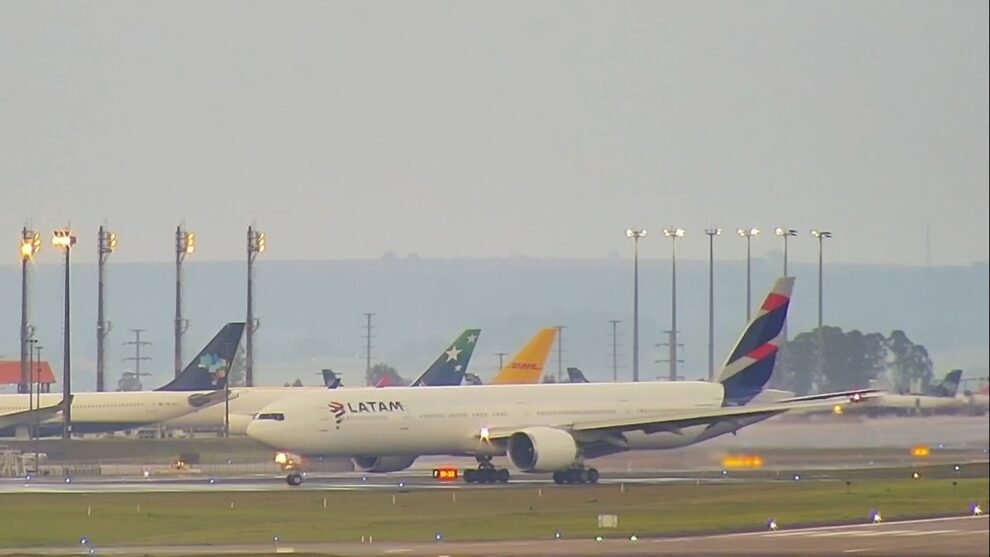LATAM Airlines is waiting for Colombian regulators to determine the capacity distribution and slots at airports throughout the country. The move follows both ultra-low-cost carriers (ULCC) Viva Air Colombia and Ultra Air, ceasing operations earlier this year.
Viva reportedly ceased its operations temporarily as Avianca, Colombia’s largest airline, was approved by the country’s civil aviation regulator to acquire it. However, LATAM has attempted to delay the acquisition, arguing that the allocation of the combined airline’s slots is unclear.
Approved to merge, but with conditions
Colombia’s civil aviation authority, Aerocivil, approved the Avianca-Viva acquisition in March, but it has been over a month since Viva Air operated a flight. The deal, however, comes with stipulations in which the airlines agree to refund passengers for Viva’s canceled flights and to continue with Viva’s ULCC business model. More than 90,000 passengers were stranded or affected by Viva ending operations, prompting LATAM and Avianca to help relocate those travelers.
Aerocivil also enforced that Avianca and Viva would need to return summer and winter slots in demand at Bogota El Dorado International Airport (BOG). According to Air Insight Group, Viva’s main airports that it operated at were Medellín International Airport (MDE) and BOG, with nearly 55% of all flights departing from the two airports.
Ultra Air ended its operation in late March. The ULCC, which was smaller than Viva Air, only had a fleet of six Airbus A320 family aircraft and operated exclusively to domestic destinations.
Delaying the acquisition
With two airlines no longer operating, LATAM could potentially gain more slots. LATAM expressed interest in acquiring Viva near the end of February, but a formal offer was not made. Adversely, LATAM filed an appeal to block the Avianca-Viva acquisition last month, demanding clarification on what will happen to the slots at BOG. The airline also argued that Viva had not returned the slots at the airport, which was one of the stipulations that Aerocivil had stated as a result of the acquisition approval.
LATAM’s appeal effectively delays the merger because Aerocivil will need to evaluate the airline’s case and provide a response.
The impact on Colombian airports
The end of Ultra and Viva being temporarily inactive, Colombia is losing about 15% of departures and seats compared to December 2022, according to Air Insight Group.
| Origin | Ops/Week Apr. 2023 | Seats Apr. 23 | Ops/Week Dec. 2022 | Seats Dec. 2022 | Percentage Difference | Percentage Difference |
|---|---|---|---|---|---|---|
| Bogota El Dorado International Airport (BOG) | 2,655 | 438,697 | 2,845 | 459,909 | (6.7%) | (4.6%) |
| Medellin Jose Maria Cordova International Airport (MDE) | 736 | 127,193 | 1,055 | 182,407 | (30.2%) | (30.3%) |
| Alfonso Bonilla Aragón International Airport (CLO) | 514 | 79,589 | 561 | 85,882 | (8.4%) | (7.3%) |
| Rafael Núñez International Airport (CTG) | 408 | 70,684 | 464 | 81,684 | (12.1%) | (13.5%) |
| Olaya Herrera Airport (EOH) | 329 | 15,735 | 381 | 17,909 | (13.6%) | (12.1%) |
According to Aviation Weekly, the lengthy grounding of Viva Air will make Avianca’s efforts to merge with the airline more challenging. Simple Flying previously reported that many of Viva’s Airbus aircraft have been placed into storage in the US. Additionally, other airlines are looking to add more aircraft to support their operation. LATAM is planning to add five planes to its fleet, while South American low-cost carrier JetSMART hopes to operate a new domestic network in Colombia.
Source : Simple Flying
















